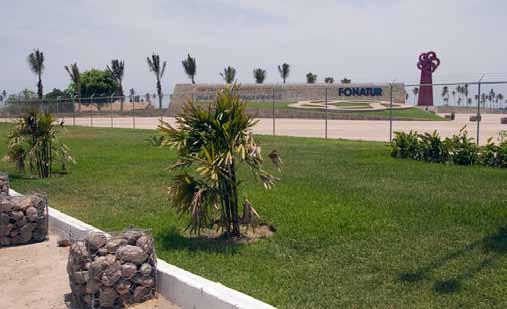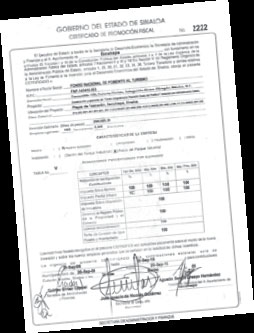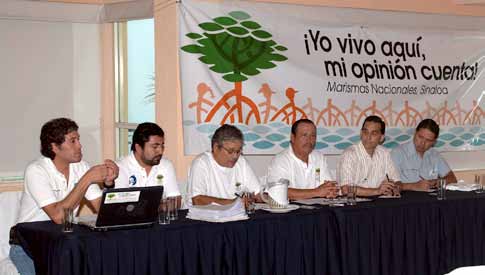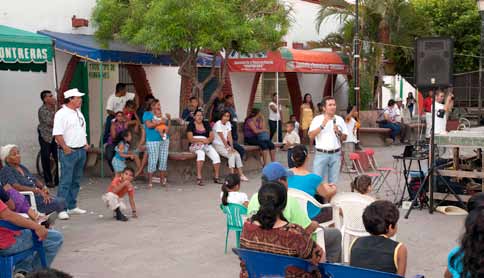 The grounds of the National Fund for the Promotion of Tourism (FONATUR) are to be a principal part of the Pacific Coast Integrally Planned Center project.
The grounds of the National Fund for the Promotion of Tourism (FONATUR) are to be a principal part of the Pacific Coast Integrally Planned Center project. (Photo: Ernesto Bolado Martínez)
 The grounds of the National Fund for the Promotion of Tourism (FONATUR) are to be a principal part of the Pacific Coast Integrally Planned Center project.
The grounds of the National Fund for the Promotion of Tourism (FONATUR) are to be a principal part of the Pacific Coast Integrally Planned Center project. For this purpose a position paper on the Regional Tourism Plan for Rosario-Teacapán was developed with support from the Centro Mexicano de Derecho Ambiental A.C., SuMar, Voces por la Naturaleza A.C., ProEsteros, A.C., Conselva, A.C, Grupo Ecológico Manglar A.C., Conservación y Rehabilitación de Fauna Silvestre y su Hábitat A.C., Red Ecologista por el Desarrollo de Escuinapa, A.C. and Defensa Ambiental Noroeste A.C.
Then, Greenpeace Mexico pointed out that the project "does not meet Semarnat’s requirements because it does not take into account the environmental impact study", and demanded the work be stopped until the authorization was obtained.
Subsequently, the then-General Director of Fonatur, Miguel Gomez Mont, said publicly that Fonatur would complete all of the studies needed to ensure sustainable development in accordance with the law.
Since the environmental impact statement was filed, the permit only includes the projects that will be carried out by Fonatur. Everything
Who gets rich and who becomes poorer?
While residents of Escuinapa, Rosario, Teacapán and surrounding communities currently lack water, sewage, solid waste disposal and other services, Fonatur has exempted the following taxes, fees, and charges in order to encourage development by large investors:
1. Payroll tax: 100 percent until the seventh year
2. Urban Property Tax: 100 percent until the seventh year
3. Real Estate Acquisition Tax: 100 percent
4. Rights of Public Registry of Property and Commerce: 100 percent
5. Building Permit: 100 percent
6. Water and sewer connection fees: 100 percent
Conditional approval by the Secretary of the Environment and Natural Resources (Semarnat) allowing Fonatur (the National Fund for Tourism Development) to build the first phase of its mega-tourism development, the Pacific Coast Integrally Planned Center (CIP),leaves much to be desired. According to the statement from organized civil society groups, it is "a clear message that, faced with future investments of this kind in Northwest Mexico, authorities can simply ignore attempts by citizens to defend the nation’s natural resources.
As a result, residents of the municipalities of Rosario and Escuinapa have come together to form a Citizens' Watchdog Group, to follow up on the fulfillment of the permit’s conditions and their effect on the globally important National Wetlands, recognized as a Ramsar site and soon to be declared a Natural Protected Area.
"The voices of people in social and economic sectors need to be heard to help reduce potential impacts on existing productive activities," said members of the campaign of the NGO group Yo vivo aquí, mi opinión cuenta (I Live Here, My Opinion Counts, in English).
Semarnat has, through its Environmental Impact and Risk Directorate (DGIRA), authorized Fonatur to continue work on the project with a number of important conditions attached. These were based on the technical opinions of government agencies including the National Commission on Natural Protected Areas (CONANP), the Mexican Water Technology Institute (IMTA), the National Water Commission (Conagua), the National Commission for the Understanding and Use of Biodiversity (Conabio).
In setting the conditions, DGIRA also took into consideration reports submitted to Semarnat outlining concerns from the fishing, agriculture, aquaculture and service sectors in the municipality of Escuinapa.
 However, according to public observations reported to date, this decision did not take into account many of the contributions from technical experts nor the outcry from citizen activists responding to the imposition of infrastructure projects that were conceived to benefit only large investors.
However, according to public observations reported to date, this decision did not take into account many of the contributions from technical experts nor the outcry from citizen activists responding to the imposition of infrastructure projects that were conceived to benefit only large investors.
Official document shows that investors
do not have to pay taxes.
else (which will be carried out by private individuals or companies) will require individual review.
Fonatur had planned a development of approximately 558 acres devoted to hotels with 43,981 rooms, three golf courses on 544 acres, two marinas with 400 berths, a tourist jetty, a walking trail past the wetlands’ lakes, shopping and entertainment boulevards and other services.
The authorization by Semarnat reduces the project to 10,000 rooms on an area of 22 acres and only one golf course of 292 acres.
 Spokesmen for the campaign "I Live Here, My Opinion Counts" hold a press conference. (Photo: Sumar - Voces por la Naturaleza)
Spokesmen for the campaign "I Live Here, My Opinion Counts" hold a press conference. (Photo: Sumar - Voces por la Naturaleza)
 Carlos Simental heads the campaing for REDES (the Ecology Network for the Development of Escuinapa, in English). (Photo: Ernesto Bolado Martínez)
Carlos Simental heads the campaing for REDES (the Ecology Network for the Development of Escuinapa, in English). (Photo: Ernesto Bolado Martínez)
"The project has not been modified by Fonatur or DGIRA. Approval of subsequent phases has only been postponed until all of the conditions have been met," says Carlos Simental, director of Redes (the Ecology Network for the Development of Escuinapa).
The authorized tourist projects (hotel, golf course and sports area) are conditional upon Conagua ensuring a sufficient supply of potable water that doesn’t interfere with ongoing social and economic activities.
However, DGIRA dismissed the observations of Conagua and those of six other national government agencies, as well as an international one, the Ramsar Convention on Wetlands of International Importance, said Simental.
"All eight agree that the project is not environmentally viable, either in whole or in specific parts such as the marina, due to the impacts it will generate," he said.
The technical report from Conagua specifically says the aquifer will become salty and affect agriculture if an access channel is opened to the marina.
Even with the restrictions, risks remain to the aquifer, because the construction of the marina is still authorized. The constraints are limited only to the requirement that the plaintiffs present studies which demonstrate that the project will not affect the aquifer nor erode the coast, even in the case of hurricanes, and that the amount of salinity in the water table must be monitored.